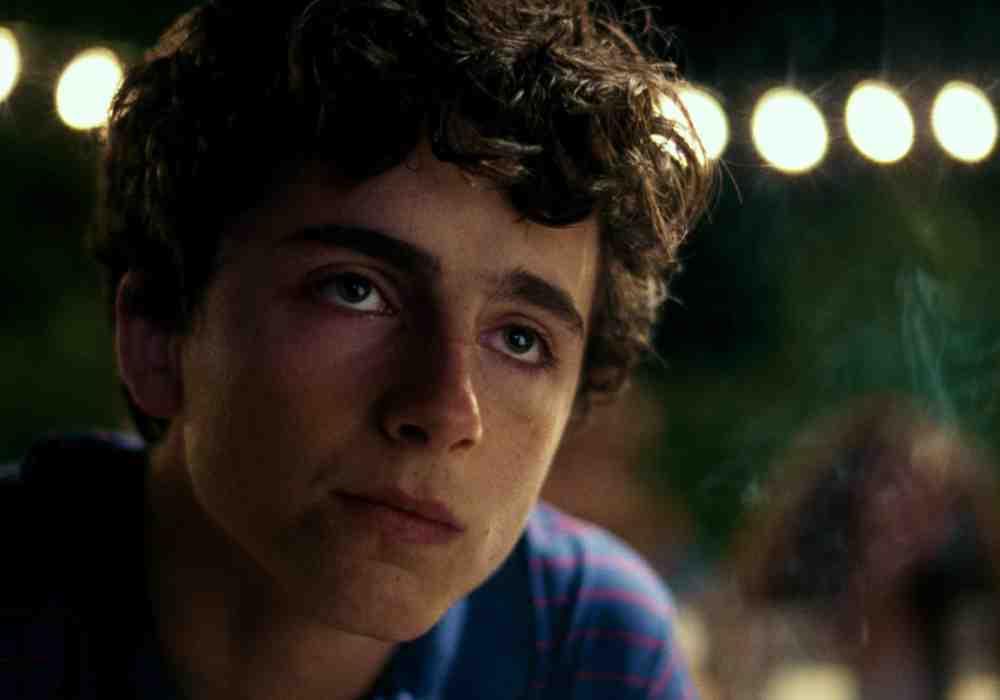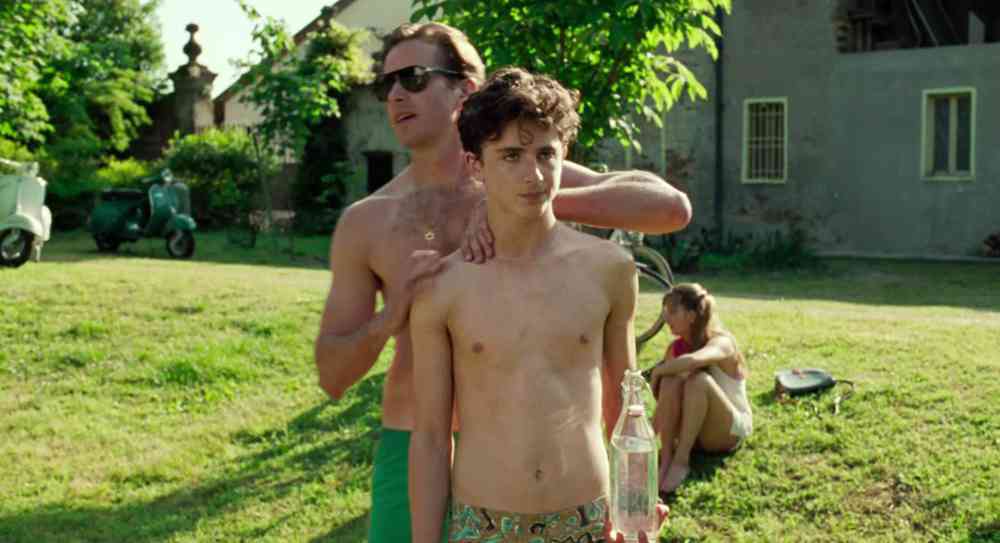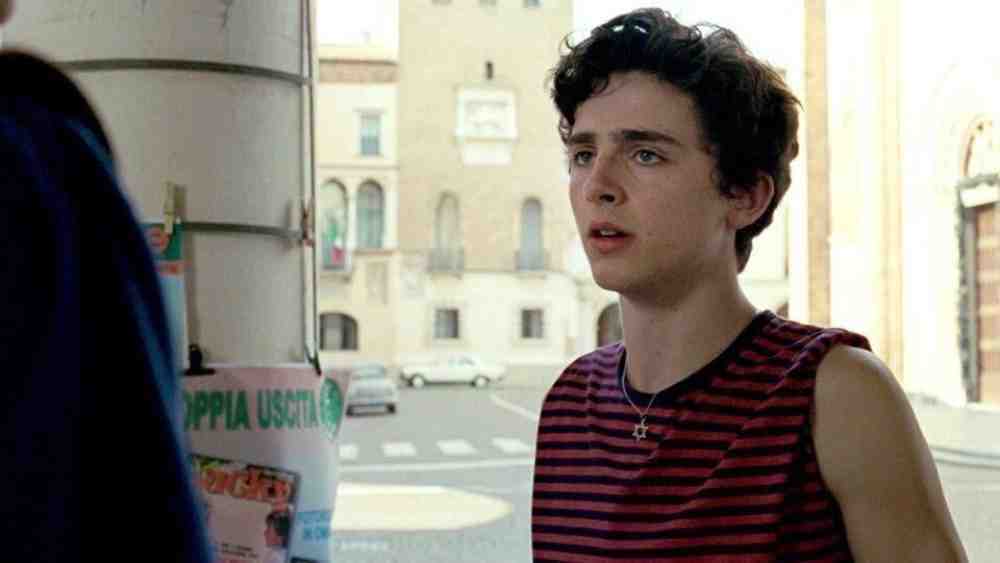In Call Me by Your Name, Timothée Chalamet conveys how words aren’t enough for Elio. His body reveals the feelings he leaves unspoken. This is an excerpt from the ebook Call Me by Your Name: A Special Issue, which is available to purchase here. To read the complete article, get your copy of the ebook here.

Discover one film you didn’t know you needed:
Not in the zeitgeist. Not pushed by streamers.
But still easy to find — and worth sitting with.
And a guide to help you do just that.
And I would say I love you, but saying it out loud is hard.” – ‘Futile Devices’, Sufjan Stevens
When Elio Perlman (Timothée Chalamet) finds the courage to speak and tell his family’s summer house guest, Oliver (Armie Hammer), how he really feels about him, he does so indirectly. The 17-year-old’s words are futile devices, posing questions more than providing answers. Words alone can’t convey the enormity of Elio’s feelings for the 24-year-old American graduate student. His body, moving closer to Oliver’s, speaks more clearly. The question “Is it better to speak or to die?” – drawn from a medieval tale in which a young knight anxiously wonders if the woman he loves feels the same way – echoes throughout Luca Guadagnino’s Call Me By Your Name.
Listen to our podcast about Find Me, the Call Me by Your Name sequel
Timothée Chalamet’s performance as Elio reveals just how out of synch Elio’s words and actions are when it comes to his burgeoning desire for Oliver. Elio is a character who barely speaks; when he does, he’s rarely able to say what he means. Chalamet’s line readings convey how Elio’s precocious intelligence and bookish knowledge are a shield against his lack of life experience. As the son of an academic, Elio has faith that language can reveal the truth about the world; that words give ideas a discernible shape. But Oliver’s arrival completely dismantles this. Elio comes to understand his desire for Oliver through his body, not his mind.
[wcm_restrict]
Revealing his true feelings is a risk for Elio. He protects himself by keeping his distance from Oliver and he’s initially abrasive when he does venture closer. Elio is aware of this flaw. After their piano flirtation, we see Elio scribbling in his diary that he had previously been “too harsh” towards Oliver. Even when Elio is ready to tell Oliver how he feels, he stumbles over words and circumvents what he really means. When Elio and Oliver walk around the Battle of Piave monument, Oliver’s question, “Is there anything you don’t know?” is a loaded one. About to divulge how he feels, Elio says that he knows little about “the things that matter,” but isn’t able to elaborate aloud on what those things are. “You know what things,” he says, instead. Chalamet’s emphasis on ‘things’ poses an innocent challenge. He looks up, hoping the older man will speak for him.
[clickToTweet tweet=”‘Elio has faith that language can reveal the truth about the world. Oliver’s arrival dismantles this.'” quote=”‘Elio has faith that language can reveal the truth about the world. Oliver’s arrival dismantles this.'”]
If words don’t come easily to Elio, Chalamet’s performance makes sure that his physical and facial gestures are less ambiguous. We see this when Oliver doesn’t show up for dinner one night early in his stay. With an exaggerated flourish of his hand, Elio mocks Oliver’s habit of saying “Later!”. But behind this air of irritated indifference, Chalamet lets Elio reveal something more fragile. As the housekeeper, Mafalda (Vanda Capriolo), removes Oliver’s plate from the table, Elio’s attitude shifts from swagger to disappointment. His eyes are visibly wet and close to tears as he looks towards his mother for reassurance and comfort. That night, Elio is restless and horny. We see him tossing and turning in bed, unable to sleep. Chalamet’s sharp, jerky movements reveal once again how Elio’s body betrays his words. He might seem impervious to Oliver, but something is clearly stirring inside him.
Buy our Call Me by Your Name Special Issue eBook, and read this essay side by side with a performance analysis of Chalamet’s co-star, Armie Hammer.
Without first-person narration to bring us inside Elio’s head (as André Aciman uses in the novel), we access his inner life almost entirely through Chalamet’s physical performance. Guadagnino favours wide shots over close ups, which demand that Chalamet use all of his slight, lanky body to show us how Elio feels. He varies his posture, shrugs his shoulders, slumps, and struts to communicate the tumultuous mess that lies beneath Elio’s seemingly calm surface. Chalamet’s body shows us that Elio’s confidence is increasing, too. When Elio takes Oliver to his secret reading place by the river, Chalamet’s spine straightens, allowing Elio to look him directly in the eye. A two-shot captures this very deliberate incursion into Oliver’s space. Without words, we understand that Elio is daring Oliver sexually, as well as revealing his own emotional growth.
[clickToTweet tweet=”‘Chalamet is a watchful, unguarded performer.’ – @JoannaDiMattia” quote=”‘Chalamet is a watchful, unguarded performer.'”]
Chalamet is a watchful, unguarded performer. Elio is shy and uncertain. He reveals the most about himself when he seems to be doing nothing more than sitting, standing, sulking silently, or lying still. The tension in Chalamet’s body and face make it clear that Elio is always actively thinking and feeling something. Elio’s earliest interactions with Oliver are shaped around this dynamic of looking and listening at a distance. He first sees him from his bedroom window where he says to Marzia (Esther Garrel) that Oliver “seems very confident.” While Chalamet delivers the line with a resentful, judgmental tone, his body practically leaps to the window to see Oliver, suggesting excitement and acute curiosity.
Whether Elio is watching Oliver from across the lawn, or as Oliver slow dances with Chiara (Victoire Du Bois), Chalamet translates Elio’s constant internal monologue with eyes lowered and lips often slightly parted. This gives him both a thoughtful and sensual expression. At Oliver’s first breakfast with the Perlmans, Elio watches Oliver intently and silently. Guadagnino moves the camera in so we see Elio observing Oliver’s necklace, a Star of David pendant that becomes a symbol of connection between the two Jewish men. In addition, Oliver’s statement about his appetites — if he eats more than one oozing soft-boiled egg, he won’t be able to stop — intrigues Elio. “I know myself,” Oliver declares, and Chalamet registers the significance of this statement with a shift in expression. Elio doesn’t speak but looks at Oliver quizzically, unsettled by this decisiveness; he’s less sure of himself. Similarly, when Marzia tells Elio that Chiara wants Oliver “at any cost,” Elio is fascinated by this intensity of feeling — as well as the sight of Oliver moving. Both inflame his interest; he leans forward in his chair, eyes wide open, biting his lip in consideration.

Chalamet’s performance captures Elio’s insecurity and teenage arrogance. When Oliver attempts to take control of the situation between them, massaging Elio’s shoulder during a volleyball game, Chalamet draws attention to his confusion. The incursion into his space stops Elio dead in his tracks. Guadagnino is keenly interested in Elio’s response to being touched here. The camera moves from Elio’s shoulder around to face him and takes in how his entire body reverberates. His expression hardens. He looks stunned; his shoulders tense. He doesn’t know what to say, except, unconvincingly, that he is relaxed. Is Elio annoyed, uncomfortable, turned on, or some combination of all of these? The way Chalamet looks at Hammer in this scene, along with his stiff movements — stepping away, refusing to surrender his body into Oliver’s hands — captures an authentic reaction. Elio is not yet able to read the signs that Oliver is trying to send him about his own desire.
Elio’s desire for Oliver, who is so comfortable in his own skin, effectively draws him out of his head and into his body. Chalamet builds Elio’s aroused physicality into his performance. Once his desire is awoken, he seems to be in perpetual motion. Chalamet employs nervy but daring physical gestures to communicate Elio’s eagerness to discover more. We see this first when Elio joins Oliver on the dance floor for “Love My Way” by The Psychedelic Furs. Elio zooms in and out of Oliver’s space, enjoying a new sense of physical freedom. Chalamet’s body roll communicates how Elio is becoming more at ease with himself. In the days after, Elio finds himself home alone and bored. He ends up in Oliver’s bedroom and places Oliver’s red swimming shorts over his face. He breathes in Oliver’s scent, absorbed in the urgency and arousal of this clandestine moment. Chalamet builds and releases sexual tension with his body, thrusting up and down slowly on the bed. With the shorts placed over Elio’s head, Guadagnino doesn’t focus simply on Chalamet’s facial expression but the full extension of his body in these actions.
[clickToTweet tweet=”‘Elio’s desire for Oliver effectively draws him out of his head and into his body.'” quote=”‘Elio’s desire for Oliver effectively draws him out of his head and into his body.'”]
Chalamet’s performance deepens as Elio’s experience does. Gestures highlight Elio’s inexperience and hungry enthusiasm. We see that Elio is propelled by desire and fear in equal parts. His moves towards Oliver are tentative and exploratory. Elio’s fingers reach out to touch Oliver’s face and neck during a foot massage; his tongue explores Oliver’s lips, not daring to venture further in; he playfully bites Oliver’s shoulder and practically scampers up his body before they have sex.
In the lead up to, during, and after Elio and Oliver sleep together, Elio’s feelings continue to travel a turbulent course. We see his insecurity before they fall into bed, as Oliver takes the lead and undresses more quickly. We see it when Elio wakes up, confused, maybe unsure about what has happened between them; he is once again cool and remote. While Oliver warmly moves closer, Elio sits up and draws his body away, turning his head to the window. Chalamet conveys the full impact of Elio’s experience with Oliver. Having sex isn’t simply the achievement of an ultimate goal, but an event that unleashes ecstasy, confusion and further self-doubt.

Call Me by Your Name concludes with an extended close-up sequence of Elio’s face that highlights the wisdom and authenticity of Chalamet’s performance. It is Hanukkah, the winter after the summer that has changed Elio’s life. After a devastating phone call from Oliver, Elio sits down in front of the fireplace, ostensibly seated before the camera, and silently expresses his grief. He cries. He aches. He gets angry. There is a flash of a smile; a joyous memory. Perhaps bittersweet acceptance and resolution, too. For several minutes, as the credits roll and Sufjan Stevens sings the line, “I have loved you for the last time” (from the song “Visions of Gideon”), Chalamet doesn’t speak and barely moves, beyond subtle modulations of his mouth, eyes, and breath. Yet he does everything required to bruise our hearts while showing us that Elio’s is caving in.
[clickToTweet tweet=”‘Chalamet’s eyes reveal the memory of the ecstasy of being with Oliver and the agony of losing him.'” quote=”‘Chalamet’s eyes reveal the memory of the ecstasy of being with Oliver and the agony of losing him.'”]
Chalamet’s eyes reveal both the memory of the ecstasy of Elio’s time with Oliver and the immense agony of losing him. It is no exaggeration to say that, through them, he allows us to see inside his soul. In a film of acutely sensitive moments, what Chalamet does here, as Elio breaks down and begins to put himself together again, is very special. It’s a completely transparent performance. There are no masks. Mr Perlman (Michael Stulhbarg) has wisely advised his son not to make himself “feel nothing so as not to feel anything.” Here, Chalamet exposes how Elio feels it all. We do, too — the totality of his experience of first love, from lust to heartbreak. No words required. Guadagnino has described Chalamet as a “beautiful, budding flower,” but in Call Me By Your Name, he is truly an actor in full bloom.
Buy our Call Me by Your Name Special Issue eBook for 20% off with your members’ discount, and gain access to this issue the way it was meant to be read.
We pride ourselves on discovering emerging actors before they make it big — and analyse their work in detail. We’ve previously gone deep on Jack Lowden’s work, especially in Dunkirk and Denial. We talked to Josh O’Connor about his entire career to date and how it prepared him to play Johnny in God’s Own Country, then analysed why this performance was so remarkable. We also took a look at six breakout performances at the 2018 Sundance Film Festival, several of which were for new queer films. [/wcm_restrict]


